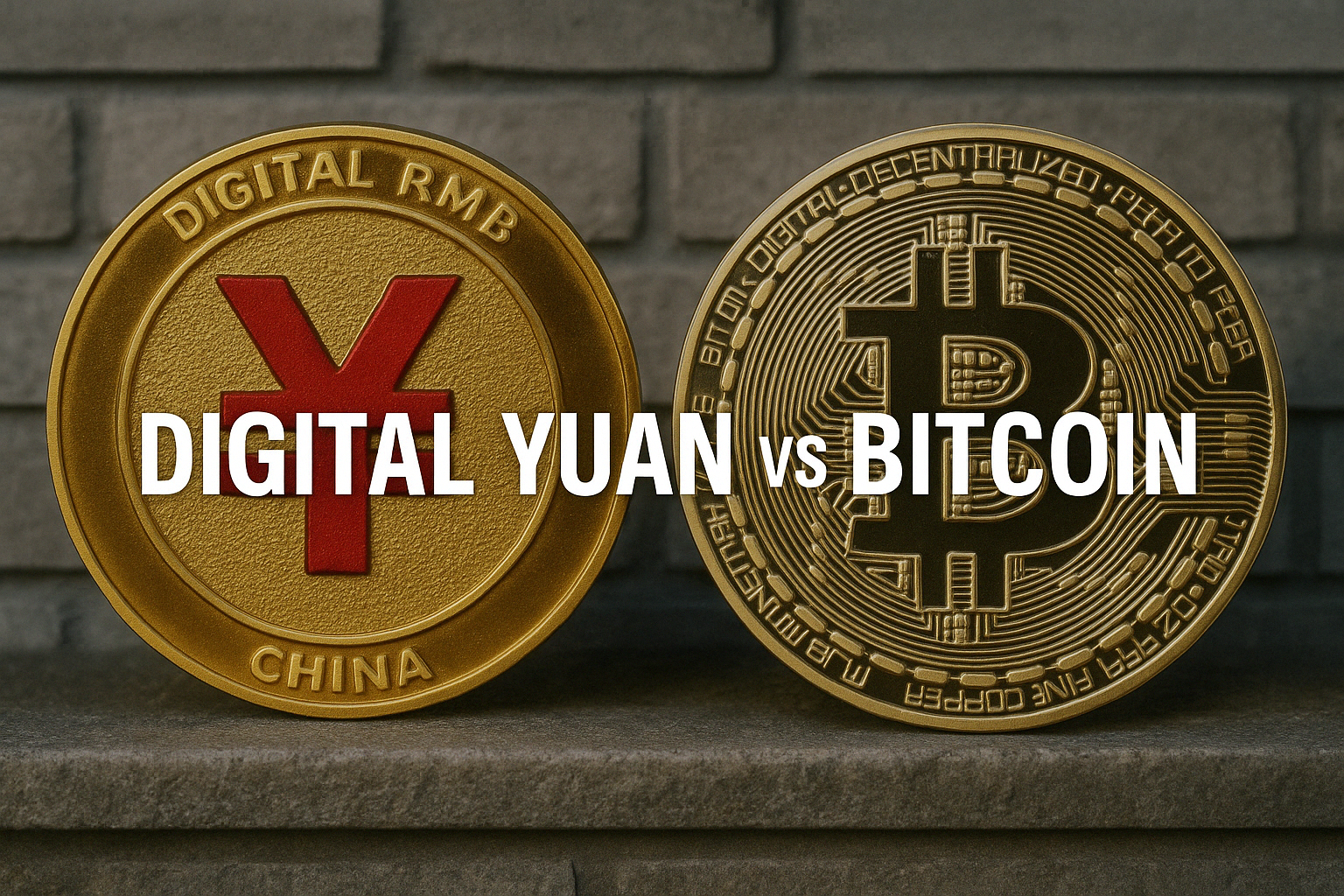Digital Yuan vs Bitcoin: Who Will Dominate the Future of Money?

In the evolving landscape of global finance, the race between China's digital currency, Bitcoin, and other decentralized assets is not just about technology — it's about control, ideology, and economic influence.
While governments are racing to issue digital currencies, Bitcoin — the original cryptocurrency — continues to grow as a decentralized hedge against inflation and centralized control. Meanwhile, China leads the central bank digital currency (CBDC) movement with its digital yuan, also known as e-CNY or Chinese token.
But can a centralized, government-backed digital currency outperform a decentralized global asset like Bitcoin?
Let’s compare digital yuan vs Bitcoin, understand the implications for monetary systems, and examine which might lead the future of money.
💡 Understanding the Digital Yuan (e-CNY)
The digital yuan is China’s official central bank digital currency (CBDC), issued by the People’s Bank of China (PBoC).
🔍 Key Features:
Centralized and fully controlled by the Chinese government
Backed 1:1 by the traditional yuan (CNY)
Operates on a permissioned blockchain
Distributed via commercial banks and select digital wallets
Designed to replace cash, not compete with commercial banks
📌 Objectives of the Digital Yuan:
Increase monetary control and financial surveillance
Reduce reliance on the U.S. dollar for global trade
Challenge the dominance of payment platforms like Alipay and WeChat Pay
Enable cross-border transactions, especially under the BRI (Belt & Road Initiative)
✅ Digital currency from a state with tight capital controls is now programmable, trackable, and globally deployable.
₿ What Makes Bitcoin Different?
Bitcoin (BTC) is a decentralized digital currency, with no central authority. It is:
Borderless
Censorship-resistant
Limited in supply (21 million BTC)
Secured by a proof-of-work blockchain
Since its launch in 2009, Bitcoin has grown from a niche asset to:
A store of value ("digital gold")
A payment method
A hedge against currency devaluation
A tool for financial freedom in oppressive regimes
🧠 Digital Yuan vs Bitcoin: Key Differences
| Feature | Digital Yuan (e-CNY) | Bitcoin (BTC) |
|---|---|---|
| Issuer | Centralized (PBoC) | Decentralized (Open Source) |
| Supply | Unlimited, based on policy | Fixed (21 million) |
| Transparency | Government-monitored | Public blockchain |
| Usage | Domestic payments, pilot cross-border | Global payments, investment |
| Identity | Linked to national ID | Pseudonymous |
| Control | Programmable and revocable | User-controlled |
🌍 Global Reach: What Country Uses Yuan?
The Chinese yuan (CNY) is primarily used in China, but its influence is spreading:
Digital yuan pilot programs launched in 25+ cities
Cross-border payments trials with Thailand, UAE, and Hong Kong
Trade settlements under the Belt & Road initiative
Integration with smart city infrastructure
In contrast, Bitcoin is used in over 100 countries, from retail payments to international remittances.
🔮 Which Digital Currency Will Win?
It depends on how you define “win.”
🏦 If it's about government control and monetary stability:
Digital yuan will thrive in state-controlled economies, enabling targeted monetary policy, real-time tax collection, and data-driven subsidies.
🌐 If it's about freedom, decentralization, and privacy:
Bitcoin is unmatched. It's permissionless, finite, and resistant to censorship, empowering users, especially in countries with inflation or capital restrictions.
People Also Ask (SEO FAQs)
❓Which digital currency is best for the future?
It depends on the use case:
Digital yuan is best for government-controlled systems, taxation, and domestic adoption in China.
Bitcoin is best for global users seeking decentralization, borderless finance, and inflation protection.
❓Can Bitcoin be the future of money?
Yes, Bitcoin can become the future of money, especially as an international store of value and medium of exchange in regions with weak currencies or authoritarian controls.
❓What is the strongest digital currency in the world?
In terms of adoption and decentralization, Bitcoin
In terms of institutional backing and state power, the Digital Yuan
In terms of utility across blockchains, Stablecoins like USDT, USDC
📊 Where Each Stands in 2025
| Metric | Digital Yuan | Bitcoin |
|---|---|---|
| Countries using | 10+ in pilot | 100+ globally |
| Government control | Full | None |
| Energy usage | Low | High (PoW) |
| Privacy | Minimal | Moderate |
| Value Volatility | None (pegged) | High (market-driven) |
| Developer Ecosystem | Government only | Open source, global |
| Use in DeFi | Limited | Extensive (wrapped BTC, etc.) |
🚧 Challenges Each Faces
🔻 Digital Yuan:
Potential surveillance concerns
Global pushback from Western economies
Limited appeal outside China-aligned nations
🔻 Bitcoin:
Volatility hinders mainstream payment use
Regulatory uncertainty in some countries
Environmental concerns (though declining with renewables)
🧠 How the World Is Responding
U.S., EU, and India are exploring their own CBDCs in response to China’s lead
El Salvador and some African nations are adopting Bitcoin
Russia, Iran, and Venezuela are turning to crypto for sanctions evasion
Tech giants are investing in Bitcoin infrastructure, while governments regulate crypto wallets
The global financial system is splitting — one path led by state digital currencies, another by decentralized crypto networks.
⚠️ Disclaimer
This article is for educational and informational purposes only and does not constitute financial, investment, or legal advice. Please consult a certified advisor before making investment or trading decisions involving digital currencies.
✅ Conclusion: A Dual Financial Future
In 2025, we’re heading toward a dual-track monetary world:
On one side: Digital yuan, programmable, controlled, and nationalized
On the other hand, Bitcoin, decentralized, scarce, and user-driven
Digital yuan will dominate in state-driven economies like China. It will likely be the most widely used CBDC shortly, especially for domestic utility and China's digital currency international pilot projects.
Bitcoin, meanwhile, will continue to dominate as the decentralized currency of choice for those seeking freedom, a store of value, and resistance to authoritarian controls.
Ultimately, there may not be one winner, but a world where users can choose between sovereign money and people-powered crypto.